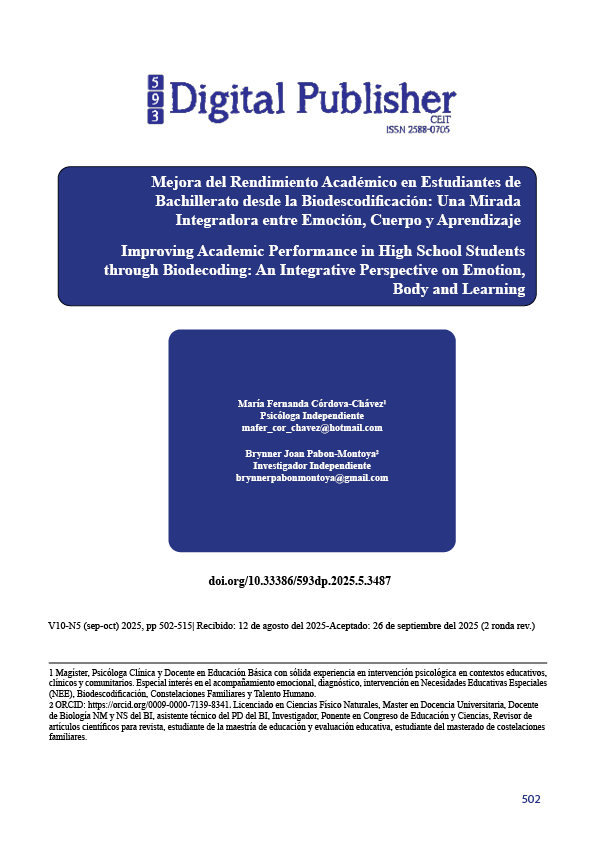Improving Academic Performance in High School Students through Biodecoding: An Integrative Perspective on Emotion, Body and Learning
Main Article Content
Abstract
The challenges of low academic performance among high school students were analyzed from an integrative perspective, considering that not only pedagogical factors influence underachievement but also emotional, family, and transgenerational elements play a role. This study is grounded in theories of emotional intelligence, neuroeducation, and transgenerational systemic approaches. The purpose of the research is to assess whether biodescodification produces significant changes in grade point averages among third-year high school students, applying statistical analysis to highlight the differences. The methodology employed follows a mixed-methods approach, with a field design and a non-probabilistic sample. The results indicate that academic blockages originate in unmanaged emotions, unconscious family loyalties, and unresolved conflicts that symbolically manifest in the student’s behavior. It is concluded that incorporating tools such as biodescodification into educational contexts can enrich the understanding of school-related symptoms and provide more human and profound solutions.
Downloads
Article Details

This work is licensed under a Creative Commons Attribution-NonCommercial-ShareAlike 4.0 International License.
1. Derechos de autor
Las obras que se publican en 593 Digital Publisher CEIT están sujetas a los siguientes términos:
1.1. 593 Digital Publisher CEIT, conserva los derechos patrimoniales (copyright) de las obras publicadas, favorece y permite la reutilización de las mismas bajo la licencia Licencia Creative Commons 4.0 de Reconocimiento-NoComercial-CompartirIgual 4.0, por lo cual se pueden copiar, usar, difundir, transmitir y exponer públicamente, siempre que:
1.1.a. Se cite la autoría y fuente original de su publicación (revista, editorial, URL).
1.1.b. No se usen para fines comerciales u onerosos.
1.1.c. Se mencione la existencia y especificaciones de esta licencia de uso.
References
Caballero, A., García, A., & Olivares, S. (2020). Neuroeducation and emotional learning: Towards a comprehensive understanding of student development. International Journal of Cognitive Research in Science, Engineering and Education, 8(2), 93–102. https://doi.org/10.23947/2334-8496-2020-8-2-93-102
Corbera, E. (2017). El arte de desaprender. Ediciones Obelisco.
Dispenza, J. (2014). Deja de ser tú: La mente crea la realidad. Urano.
Damasio, A. (1994). El error de Descartes: emoción, razón y cerebro humano. Crítica.
Extremera, N., & Fernández-Berrocal, P. (2004). El papel de la inteligencia emocional en el alumnado: Evidencias empíricas. Revista Electrónica de Investigación Educativa, 6(2), 1–17.
Fernández-Berrocal, P., Gutiérrez-Cobo, M. J., & Cabello, R. (2021). Emotional intelligence and academic performance: A meta-analytic review. Frontiers in Psychology, 12, 667373. https://doi.org/10.3389/fpsyg.2021.667373
Flèche, C. (2009). Las bases de la biodescodificación. Barcelona: Ediciones Obelisco.
González, L., & Martínez, P. (2021). Factores emocionales y familiares en el rendimiento académico de estudiantes de secundaria. Revista Iberoamericana de Psicología Educativa, 34(2), 45–59. https://doi.org/10.1234/ripedu.2021.34.2.45
González-Valero, G., Zurita-Ortega, F., Ubago-Jiménez, J. L., & Puertas-Molero, P. (2021). Emotional regulation and academic performance in secondary school: The mediating role of academic self-efficacy. Sustainability, 13(6), 3023. https://doi.org/10.3390/su13063023
Hernández Sampieri, R., Fernández Collado, C., & Baptista Lucio, P. (2014). Metodología de la investigación (6.ª ed.). McGraw-Hill.
Jodorowsky, A. (2009). La biodescodificación: Nuevas puertas para sanar. Ediciones Roca.
MacCann, C., Jiang, Y., Brown, L. E. R., Double, K. S., Bucich, M., & Minbashian, A. (2020). Emotional intelligence predicts academic performance: A meta-analysis. Psychological Bulletin, 146(2), 150–186. https://doi.org/10.1037/bul000021.
Medina, J. (2008). Brain rules: 12 principles for surviving and thriving at work, home, and school. Seattle: Pear Press.
Rodríguez-Ledo, C., Mendaña-Cuervo, C., & González-González, H. (2022). Academic performance and cooperative learning: The role of emotional competencies. Thinking Skills and Creativity, 44, 101028. https://doi.org/10.1016/j.tsc.2022.101028
Perroni, R. (2013). Biodescodificación: La salud emocional como base del bienestar. Ediciones EDAF.
Sabbah, C. (2013). La enfermedad como camino de curación: El sentido biológico y emocional de los síntomas. Barcelona: Editorial Sirio.
UNESCO. (2020). Global education monitoring report 2020: Inclusion and education – All means all. París: UNESCO.
Zhao, S., Zhang, X., & Wang, Y. (2023). Predictors of academic grades: The role of interest, effort, and stress. Journal of Research in Personality, 105, 104392. https://doi.org/10.1016/j.jrp.2023.104392



